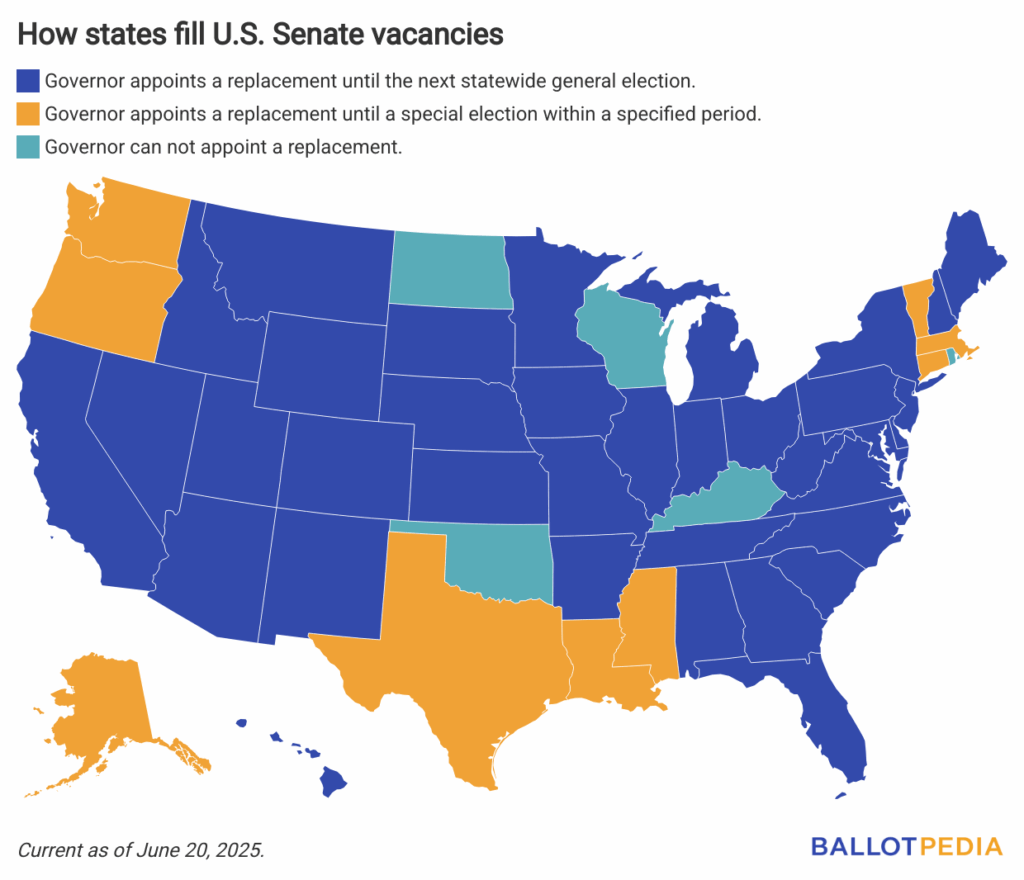On June 20, 2025, Oregon Gov. Tina Kotek (D) signed Senate Bill 952 (SB 952), which gives the governor the power to appoint an interim U.S. senator for the state if a vacancy occurs.
The bill includes the following provisions:
- Sets the timeframe for special elections called by the governor to fill a U.S. Senate vacancy at no fewer than 80 days and no more than 150 days after the vacancy.
- Requires the governor to appoint a replacement for a U.S. Senate vacancy within 30 days.
- Stipulates that appointees must be qualified citizens affiliated with the same political party as the vacating senator for at least 180 days before the vacancy.
- Provides that such appointments expire at the end of the term or upon the election and qualification of a successor, whichever is sooner.
- Prohibits the governor from appointing themselves to the vacant U.S. Senate seat.
In 36 states, governors appoint individuals to fill vacancies temporarily until a special election. The special election in those states must coincide with the next regularly scheduled election to replace the appointee.
In the remaining 14 states, a special election must happen within a certain time frame to fill the vacancy. Nine of those states allow for an interim gubernatorial appointment.

Article I, section 3 of the U.S. Constitution originally gave state legislatures the power to appoint a replacement in the U.S. Senate if the legislature was in session at the time of the vacancy. If the legislature was not in session, the state's governor would appoint a replacement until the legislature could fill the vacancy. However, the U.S. Congress passed the Seventeenth Amendment on May 13, 1912, which allows legislatures to authorize governors to appoint a replacement until a special election. It was ratified on April 8, 1913.
Oregon has a Democratic trifecta, meaning that Democrats control the governorship and both legislative chambers. On April 28, 2025, the Oregon Senate passed the bill 16-13. On June 3, 2025, the Oregon House of Representatives passed it 31-24. Forty-seven Democrats voted in favor of the bill, while three Democrats joined 34 Republicans in opposing it.
Leading up the vote on the bill, State Rep. Dwayne Yunker (R), who opposed the bill, said, "If this bill is passed and a senate vacancy arises, the governor can choose someone who has never run for office, never answered to the public, and never stood before voters to earn their trust […] What kind of accountability does that bring? The answer is none."
U.S. Sens. Ron Wyden (D-Ore.) and Jeff Merkley (D-Ore.) supported the bill. Wyden said, "This bill would prepare for any unforeseen contingency by creating a process that allows the governor to appoint a replacement in a timely fashion. That's a common-sense idea and one that puts Oregon in line with other states that don't leave a vacancy unfilled until a special election."
The last stretch of time that Oregon had a vacant U.S. Senate seat was from Oct. 1, 1995 to Feb. 6, 1996 after Sen. Bob Packwood (R-Ore.) resigned. Wyden won the special election to replace Packwood on Jan. 30, 1996.



